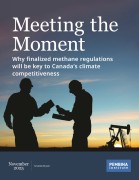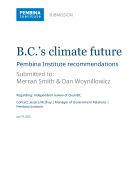Ecojustice, West Coast Environmental Law Association, Pembina Institute, Georgia Strait Alliance, and Organizing for Change have sent the following letter to the B.C. government:
October 25, 2018
Bobbi Plecas
Deputy Minister, Climate Change
Ministry of Environment and Climate Change Strategy
PO Box 9339, Stn Prov Govt
Victoria, BC V8W 9M1
Dear Deputy Minister Plecas:
Re: A climate accountability framework for B.C.
The forthcoming clean growth strategy will include welcome policies intended to significantly reduce B.C.’s greenhouse gas emissions. As part of the regulatory regime supporting this anticipated climate strategy, we also expect an accountability framework to be established following its release. We recommend that this framework be science-based, transparent, enforceable, and rooted in international best practices for regulating greenhouse gas emissions. A framework that includes rigorous planning requirements is a key opportunity for the government to deliver on the transparency and accountability that the public expects.
The following three components should constitute the core of a strong accountability framework:
- Carbon budgets and sectoral targets: Interim “carbon budgets” capping the total greenhouse gas emissions that are available to “spend” over a shorter period (five years or less). The government’s commitment to introduce “sectoral targets” could be accommodated in a carbon budget framework through sectoral sub-budgets.
- Planning mechanisms: Carbon budgets must be integral to government decision- making. Government should prepare detailed and transparent plans showing how it expects to meet the carbon budget, with clear responsibilities assigned to particular government ministers and corrective planning mechanisms to enact when the province is not on track to meet targets.
- Advisory body: An advisory body should be made responsible for preparing an annual, science-based, transparent review of government progress towards achieving both short-term carbon budgets and long-term targets.
Please find attached our detailed recommendations for how each of these components could be integrated into a robust accountability framework that will help us track progress towards our climate promises and ensure measures in the clean growth strategy are successful, transparent, and enduring.
A strong commitment from government to hold itself, and the private sector, accountable to the targets set for reducing our greenhouse gas emissions will establish the credibility necessary to help British Columbians commit to the short and long-term changes we all need to make to tackle climate change. In so doing, B.C. will help demonstrate to the world that it is possible to meet ambitious targets with smart policy, transparency, and accountability.
We look forward to the forthcoming climate strategy and continuing to work with you to establish a strong accountability framework to support it.
Sincerely,
Alan Andrews
Ecojustice
Andrew Gage
West Coast Environmental Law Association
Karen Tam Wu
Pembina Institute
Christianne Wilhelmson
Georgia Strait Alliance
Lisa Matthaus
Organizing for Change
CC:
Tim Lesiuk, Executive Director, Clean Growth Strategy
Merran Smith, Co-Chair, Climate Solutions and Clean Growth Advisory Council
Marcia Smith, Co-Chair, Climate Solutions and Clean Growth Advisory Council










